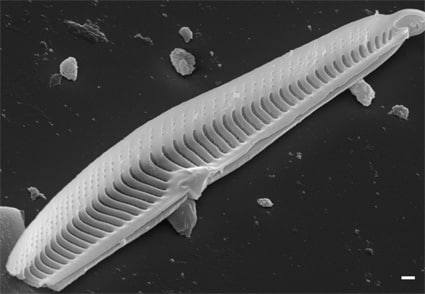About Gomphonema rajaguruii:
- It is a new freshwater diatom species.
- It was found in a semi-aquatic environment along the wet walls in Maharashtra’s popular hill station, Mahabaleshwar in Satara District.
- It was named after a veteran geo-archaeologist from the city, the late Professor S N Rajaguru.
- It is unique because it shows the characteristics of two genus – Gomphonema and Gomphoneis.
What are Diatoms?
- It is a photosynthetic, single celled organism.
- They are a major group of algae and form one of the most common forms of phytoplankton.
- They are found in almost every aquatic environment including fresh and marine waters.
- Diatoms have cell walls made of silica, Each species has a distinct pattern of tiny holes in the cell wall (frustule) through which they absorb nutrients and get rid of waste.
- Collectively, they are responsible for generating up to 50% of the oxygen produced globally each year.
Q1) What is an Algae?
Algae are a diverse group of aquatic organisms that have the ability to conduct photosynthesis. Certain algae are familiar to most people; for instance, seaweeds (such as kelp or phytoplankton), pond scum or the algal blooms in lakes. However, there exists a vast and varied world of algae that are not only helpful to us, but are critical to our existence.
Source: New oxygen-supplying algae species found in Mahabaleshwar, named after Pune scientist
Last updated on June, 2025
→ UPSC Notification 2025 was released on 22nd January 2025.
→ UPSC Prelims Result 2025 is out now for the CSE held on 25 May 2025.
→ UPSC Prelims Question Paper 2025 and Unofficial Prelims Answer Key 2025 are available now.
→ UPSC Calendar 2026 is released on 15th May, 2025.
→ The UPSC Vacancy 2025 were released 1129, out of which 979 were for UPSC CSE and remaining 150 are for UPSC IFoS.
→ UPSC Mains 2025 will be conducted on 22nd August 2025.
→ UPSC Prelims 2026 will be conducted on 24th May, 2026 & UPSC Mains 2026 will be conducted on 21st August 2026.
→ The UPSC Selection Process is of 3 stages-Prelims, Mains and Interview.
→ UPSC Result 2024 is released with latest UPSC Marksheet 2024. Check Now!
→ UPSC Toppers List 2024 is released now. Shakti Dubey is UPSC AIR 1 2024 Topper.
→ Also check Best IAS Coaching in Delhi
























